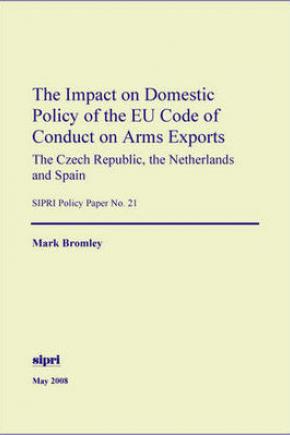The Impact on Domestic Policy of the EU Code of Conduct on Arms Exports: The Czech Republic, the Netherlands and Spain
During its lifetime, the EU Code of Conduct has had an eventful and, at times, controversial history. While big advances have been made in the field of information exchange, and participation has expanded from 15 to 27 as EU membership has increased, critics have contested that impact has either been too weak or too inconsistent. On the one hand non-governmental organizations (NGOs) and parliamentarians have contested that the mechanism has done little to genuinely raise standards by preventing transfers to human rights abusers and conflict hotspots. On the other, defence companies have complained that their government is interpreting the Code more restrictively than others, placing them at a commercial disadvantage.
This Policy Paper examines the impact of the EU Code over the course of its 10-year lifespan via a close examination of three middle-ranking EU arms exporters: the Czech Republic, the Netherlands and Spain. The analysis therefore moves beyond the three biggest European arms exporters—France, Germany, and the United Kingdom—who originally drove the development of the EU Code of Conduct and have been the main subjects of research in this area. This allows the study to take a look at what role middle-ranking arms exporters have had on the evolution of the EU Code and, in turn, what effect the EU Code has had on these state’s decision making in the issuing and denying of arms export licences. This approach leads to recommendations for how the EU Code could be strengthened and made to function more effectively
The picture that emerges is of a dynamic agreement in which smaller member states have played a strong hand in pushing developments forward. Meanwhile, states value the EU Code because it helps to support and inform decision making at the national level on the granting and denying of export licences. The example provided by other member states arms exports often helps to bolter positions in inter-ministry debates or discussions with NGOs, industry and parliament. Meanwhile, the EU Code’s mechanisms of information exchange and consultation provide a crucial input on national decision making on export licensing. However, officials are unwilling to acknowledge that the EU Code is pushing them towards more harmonized or more restrictive exports, the original aim of the agreement.
The EU Code of Conduct on Arms Exports has laid down agreed norms for judging whether or not an export licence should be granted. It has also provided a framework through which NGOs and parliamentarians can pressure governments to uphold those norms. However, decision making on whether to grant an export license lies, and will continue to lie, in the hands of member states, where it is subject to a wide array of pressures and influences that lie outside the scope of the EU Code. These dynamics are unlikely to be affected by the transformation on the EU Code into a Council common position.
1. Introduction
2. EU engagement in arms export policies
3. Case study: The Czech Republic
4. Case study: The Netherlands
5. Case study: Spain
6. Conclusions
Appendix A. The European Union Code of Conduct on Arms Exports
Appendix B. List of interviewees

